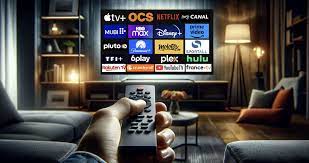In an era where traditional cable TV is facing increasing competition from streaming services, IPTV (Internet Protocol Television) is emerging as a game-changer in the way we consume television content. This technology is not just a trend but a transformative force that promises to reshape our viewing experiences. Here’s an in-depth look at what iptv abonnement is, how it works, and why it’s capturing the spotlight.
What is IPTV?
IPTV stands for Internet Protocol Television. Unlike traditional television broadcasting, which relies on satellite or cable signals, IPTV delivers TV content through the internet. This means that instead of receiving television signals through a coaxial cable or satellite dish, IPTV uses your broadband internet connection to stream content directly to your device.
How Does IPTV Work?
IPTV operates on the principle of streaming media over the internet. Here’s a simplified breakdown of the process:
- Content Acquisition: TV channels and media content are acquired by IPTV service providers. This content can range from live TV broadcasts to on-demand movies and series.
- Content Encoding: The acquired content is encoded into a digital format that can be streamed over the internet. This process involves compressing the video and audio data to ensure smooth streaming.
- Content Delivery: The encoded content is sent to IPTV servers, which then distribute it to subscribers via the internet. This delivery is often managed through a set-top box or a dedicated application on devices like smartphones, tablets, and smart TVs.
- Content Playback: Subscribers access the content through their devices, where it is decoded and played back in real-time or as requested (for on-demand content).
Types of IPTV Services
- Live TV IPTV: This service allows users to watch television broadcasts in real-time. It includes live channels and programming as they are aired.
- Time-Shifted TV: This feature enables users to watch TV shows and movies at their convenience, even if they missed the original broadcast time. This can be particularly useful for catching up on missed episodes.
- Video on Demand (VOD): VOD services provide access to a vast library of movies and TV shows that users can watch at any time. This feature offers a level of flexibility that traditional TV cannot match.
- Catch-Up TV: This service allows users to access and watch TV programs that they missed in the past few days or weeks.
Advantages of IPTV
- Flexibility and Convenience: IPTV offers unparalleled flexibility. Users can watch content on various devices, including smartphones, tablets, and smart TVs, without being tethered to a specific location.
- Customization: IPTV services often come with features that allow users to personalize their viewing experience. This can include customizable channel lists, parental controls, and personalized recommendations based on viewing history.
- Cost-Effective: Many IPTV services are more affordable than traditional cable packages. Additionally, the ability to choose only the channels and content you want can lead to cost savings.
- High Quality: IPTV can provide high-definition (HD) and even ultra-high-definition (4K) content, delivering superior picture and sound quality compared to traditional TV.
Challenges and Considerations
While IPTV offers numerous benefits, it also comes with its own set of challenges:
- Internet Dependency: IPTV requires a stable and high-speed internet connection. Poor connectivity can lead to buffering and interruptions, affecting the viewing experience.
- Content Licensing and Availability: Depending on the region, not all content may be available due to licensing restrictions. This can limit the variety of programming that subscribers can access.
- Security and Privacy: As with any online service, IPTV users should be aware of potential security and privacy concerns. It’s essential to use reputable services and be cautious about sharing personal information.
The Future of IPTV
The future of IPTV looks promising, with ongoing advancements in technology and increasing demand for flexible, on-demand content. As internet speeds continue to improve and technology evolves, IPTV is likely to become even more integrated into our daily lives.
In conclusion, IPTV represents a significant shift in television technology, offering viewers greater control, convenience, and quality. As this technology continues to develop, it’s set to redefine how we experience television, making it more adaptable to our individual preferences and lifestyles. Whether you’re a casual viewer or a dedicated binge-watcher, IPTV has something to offer for everyone.



